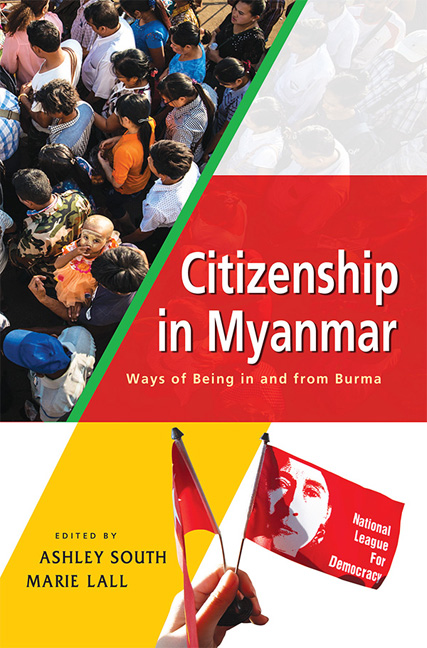Book contents
- Frontmatter
- Dedication
- Contents
- Foreword
- The Contributors
- Map of Myanmar
- Introduction
- 1 Ethnic Politics and Citizenship in History
- 2 Representation and Citizenship in the Future Integration of Ethnic Armed Actors in Myanmar/Burma
- Special Contribution: The Way Forward for Peace, Stability and Progress in Burma/Myanmar
- 3 National Political Dialogue and Practices of Citizenship in Myanmar
- 4 Citizenship and Minority Rights: The Role of “National Race Affairs” Ministers in Myanmar's 2008 Constitution
- Special Contribution: Karenni People at a Glance
- 5 Myanmar's Youth and the Question of Citizenship
- Special Contribution: I Am a Citizen of Myanmar
- 6 “The Value of Life”: Citizenship, Entitlement and Moral Legibility in Provincial Myanmar
- Special Contribution: How I Became Shan
- 7 Conflict and Mass Violence in Arakan (Rakine State): The 1942 Events and Political Identity Formation
- 8 Exploring the Issue of Citizenship in Rakhine State
- Special Contribution: Rohingya and Nationality Status in Myanmar
- 9 Myanmar's Other Muslims: The Case of the Kaman
- Special Contribution: Interview with P'doh Kweh Htoo Win
- Index
8 - Exploring the Issue of Citizenship in Rakhine State
Published online by Cambridge University Press: 28 June 2018
- Frontmatter
- Dedication
- Contents
- Foreword
- The Contributors
- Map of Myanmar
- Introduction
- 1 Ethnic Politics and Citizenship in History
- 2 Representation and Citizenship in the Future Integration of Ethnic Armed Actors in Myanmar/Burma
- Special Contribution: The Way Forward for Peace, Stability and Progress in Burma/Myanmar
- 3 National Political Dialogue and Practices of Citizenship in Myanmar
- 4 Citizenship and Minority Rights: The Role of “National Race Affairs” Ministers in Myanmar's 2008 Constitution
- Special Contribution: Karenni People at a Glance
- 5 Myanmar's Youth and the Question of Citizenship
- Special Contribution: I Am a Citizen of Myanmar
- 6 “The Value of Life”: Citizenship, Entitlement and Moral Legibility in Provincial Myanmar
- Special Contribution: How I Became Shan
- 7 Conflict and Mass Violence in Arakan (Rakine State): The 1942 Events and Political Identity Formation
- 8 Exploring the Issue of Citizenship in Rakhine State
- Special Contribution: Rohingya and Nationality Status in Myanmar
- 9 Myanmar's Other Muslims: The Case of the Kaman
- Special Contribution: Interview with P'doh Kweh Htoo Win
- Index
Summary
There are over 1 million Muslims in Rakhine State whose legal status is obscure. They are generally referred to as “Rohingya”, an ethnic designation unknown to the former British administration. Though the Rohingya are primarily located in the northern part of the state, there are many thousands, if not tens of thousands, of Muslims of Chittagonian origin living elsewhere in Myanmar who are likely to be inhibited from claiming openly to be Rohingya. There are in addition another million or more Rohingya said to be living overseas, as refugees in Bangladesh and elsewhere, or as workers in Saudi Arabia and other Gulf States.
For some time the international community has been urging the Myanmar Government to grant full citizenship rights to the Rohingya, and to review the controversial 1982 Citizenship Law in this context. But this is easier said than done as the extent of illegal immigration from Bangladesh into Rakhine State since independence in 1948 is difficult if not impossible to assess. I also argue that it is not so much the Law itself which is at fault as the failure to implement the Law in Rakhine State in a timely and responsible manner. The longer the government delays action to resolve the impasse, the more entrenched and potentially explosive the situation is likely to become.
Controversy surrounds the designation of some 1 million or more people of Islamic faith who live in Rakhine State in Myanmar. For some, this controversy is as unwelcome as it is unnecessary, since the issue at stake is the human rights, and especially the citizenship status of the people concerned. For others, the designation of the community as “Rohingya” is vital to their very survival and is not to be dismissed as a distraction.
The designation “Rohingya” is used, particularly by support organizations overseas, to refer to some reported 3 million or more Muslim residents and former residents of Rakhine State in Myanmar. These numbers should however be treated with caution. Tens of thousands of former residents of Arakan are said to have sought sanctuary overseas from the early 1940s onwards, not only in what is today Bangladesh but as far afield as Saudi Arabia and the Gulf states.
- Type
- Chapter
- Information
- Citizenship in MyanmarWays of Being in and from Burma, pp. 222 - 263Publisher: ISEAS–Yusof Ishak InstitutePrint publication year: 2017



